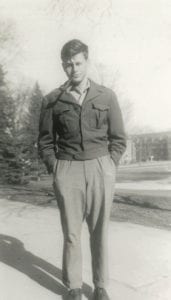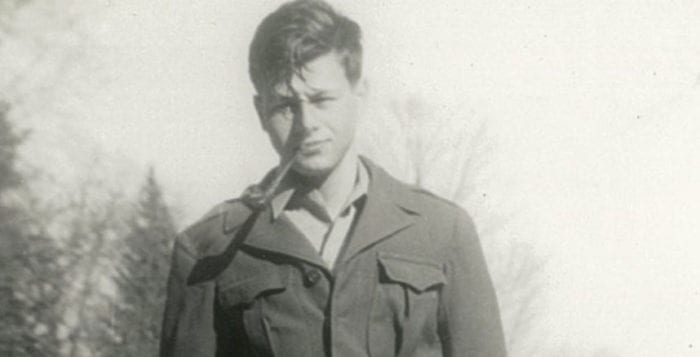A founder of the Marine Sciences Research Center at Stony Brook, which is now the School of Marine and Atmospheric Sciences, Peter Weyl died on Sunday, May 22 at the age of 92.
Weyl, who retired from Stony Brook in 1995, was surrounded by friends and family.

Weyl is survived by his wife Muriel, their son Stephen, their daughters Ruth and Lisa, five grandchildren and one great-grandchild.
Known for extensive research in a range of oceanography disciplines and for writing the first oceanography textbook, Weyl’s life and academic career took several dramatic turns.
Born in Germany on May 6, 1924, Weyl and his family, who were Jewish, left their native country in 1938 amid the build up to World War II. They moved to England, where Weyl was confined to an internment camp when he was 16. Amid modest living conditions, Weyl and a cousin heard the complaints about the fish that their fellow campmates didn’t enjoy eating.
The two of them smoked the fish, making some money along the way.
This effort reflected an enterprising nature for Weyl, who his family said loved smoking herring throughout his life.
During the war, Weyl and his family moved to the United States, where Weyl attended Stuyvesant High School. He joined the army, where he served in military intelligence, putting his knowledge of German to work. He marched into Paris when it was liberated and eventually returned to Germany.
He came back to the United States in 1946 and entered college at the University of New Hampshire. It was there that he met Muriel, a woman who made a point of speaking to him twice. The first time, she was in a library, trying to choose a picture to critique for a class.
“When he came in, he looked very cute,” she recalled. She figured it was an easy connection for her, so she asked him if she should choose one particular picture.
He said he wouldn’t pick the one she pointed out and kept walking.
Three months later, the two of them were at a dance and were the only ones dressed more casually than their peers. Muriel wore her saddle shoes and a sweater she knitted, while he had “simple clothing,” as she put it.
She walked across the room and touched his shoulder.
He turned around, looked her in the eye, and said, “You and I don’t belong here. Let’s leave,” she said. That was the first of many steps along the way to their 69-year marriage.
Noticing that her husband, who she knew was brilliant, was bored with his studies at college, she encouraged him to take an exam that would allow him to study nuclear physics for a Ph.D. At that time, the country was locked in the beginning of a scientific battle with the Soviet Union.
She gave him $100 and told him to take the test and “show me you’re smart.”
A month later, Weyl was in Chicago, where his wife would eventually join him after she graduated from college. He studied with some of the biggest names in nuclear science, including Enrico Fermi, whom Weyl considered the greatest teacher in history. He also interacted with the father of the Manhattan Project, which built the world’s first atomic bomb, Robert Oppenheimer.
Along the way, Weyl saw an opportunity to do important work in other sciences that weren’t getting that kind of attention, Stephen said. He turned his attention to the ocean.
Informed by a different scientific background, Weyl took a multidisciplinary approach to basic questions ranging from how life evolved in the ocean to how the oceans were changing, said Malcolm Bowman, distinguished service professor at the School of Marine and Atmospheric Sciences, who considered Weyl his mentor.
Bowman said Weyl focused on climate change and the ice ages 50 years before concerns about global warming heated up.
Weyl authored numerous scientific papers and wrote the first major textbook on physical oceanography, called “Oceanography: Introduction to the Marine Environment” in 1970. That book was translated into five languages, Muriel said. He also wrote a children’s book called “Men, Ants & Elephants: Size in the Animal World.”
Muriel recalled how they got calls from professors at Harvard, who appreciated how Weyl explained science.
Bowman said Weyl was the first to realize the essential contribution of New York City sewage discharges into the upper East River as the prime source of eutrophication in the Western sound. In eutrophication, nutrients cause excessive growth of algae. When the algae die, they sink to the bottom and decompose, robbing a water body of oxygen, which can lead to fish kills.
On the lookout for opportunities to fill a need, Weyl invented the main form of desalination that is used throughout the world, said Stephen Weyl. He created the original patent in which desalination uses reverse osmosis.
In a celebration of his life and their memories of a remarkable man, the Weyl family recalled how he “always had a sense of humor and saw the positive side of life,” said Lisa. That sense of humor included the liberal use of puns. He would say, “I have to say, ‘Goodbye, so I can rest a Weyl.’”
The family created the Peter K. Weyl Memorial Scholarship for students studying climate change at Stony Brook. In lieu of flowers, the family asked for contributions to the scholarship.





